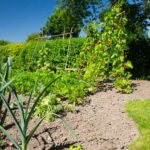Have you ever wondered, do squirrels bother vegetable gardens? Squirrels are cute and entertaining to watch as they scurry around, but their presence can be a source of frustration for gardeners. In this article, we will explore the fascinating relationship between squirrels and vegetable gardens, and delve into the behavior of these furry creatures that can sometimes wreak havoc on our prized crops.
Understanding the behavior of squirrels is essential in dealing with the challenges they may present to your vegetable garden. Exploring their natural instincts and habits will shed light on why they are drawn to certain plants and what drives them to dig, chew, or nibble on your produce. By gaining knowledge about squirrels’ behavior, we can better equip ourselves to protect our gardens from their disruptive activities.
The battle between squirrels and vegetable gardens is a common struggle for many gardeners. Squirrels have various tactics to obtain food from gardens, from raiding bird feeders to digging up freshly planted seeds. As gardeners, it’s important to be aware of these behaviors in order to implement effective strategies for protecting our vegetables from squirrel interference. Understanding their methods will allow us to use proven techniques that deter squirrels from accessing our precious crops.
Understanding the Behavior of Squirrels
Squirrels are a common sight in many gardens, but their behavior can often be perplexing for gardeners. Understanding the natural instincts of squirrels can help shed light on why they may target vegetable gardens and how to effectively deter them.
One key behavior of squirrels is their tendency to hoard food, especially during the fall when they are preparing for winter. This can lead them to raid vegetable gardens in search of easily accessible and nutritious foods to store for the colder months. Additionally, squirrels are known for their curiosity and acrobatic abilities, which allow them to access even well-protected garden areas.
To further understand squirrel behavior, consider these insights:
- Squirrels are territorial animals and may see your garden as part of their territory if it offers food and shelter.
- Squirrels have sharp teeth that enable them to chew through various materials, including plastic, wood, and even metal.
- Squirrels are active during the day (diurnal) and will often return repeatedly to a food source if they find it satisfying.
By understanding these natural instincts of squirrels, you can better prepare yourself with effective strategies for protecting your vegetable garden from their attention.
The Battle of Squirrels vs Vegetable Gardens
Squirrels are highly resourceful animals, and when it comes to vegetable gardens, they can be quite persistent. One of the common tactics used by squirrels to get into vegetable gardens is digging. Squirrels are notorious for digging up freshly planted bulbs and seeds in search of food.
They also love to dig in soft soil to bury their own food supplies. Additionally, squirrels are known to have a taste for fruits and vegetables, making them likely candidates for raiding a garden when given the chance.
Another tactic used by squirrels is climbing. These agile creatures can easily climb trees, fences, and even buildings to gain access to vegetable gardens. Once they’re in the garden, they can wreak havoc by feasting on ripe fruits and vegetables or gnawing on young plants.
Squirrels are also sneaky and clever animals. They may test different entry points into a garden until they find a way in, and once inside, they’ll use camouflage tactics like hiding behind plants or blending in with their surroundings to avoid detection.
| Tactic Used by Squirrels | Impact on Vegetable Gardens |
|---|---|
| Digging | Damage to freshly planted bulbs and seeds; disturbance of soil |
| Climbing | Access to higher areas of the garden; feasting on ripe fruits and vegetables |
| Sneakiness/Cleverness | Finding entry points; avoiding detection within the garden |
Plant Protection
If you’re tired of squirrels raiding your vegetable garden, there are several proven methods you can use to deter them from causing damage. Here are some effective strategies to keep those pesky critters at bay:
1. Install physical barriers: Creating a barrier around your garden can deter squirrels from entering. Use chicken wire or hardware cloth to surround your plants and bury it a few inches into the ground to prevent squirrels from digging underneath.
2. Use repellents: There are various squirrel repellents available on the market that can discourage squirrels from entering your garden. Consider using sprays with natural ingredients such as pepper or predator urine, which can make the area less appealing to squirrels.
3. Provide distractions: Set up feeding stations with nuts or other squirrel-friendly foods in another area of your yard. This can help divert their attention away from your vegetable garden and encourage them to dine elsewhere.
By implementing these methods, you can protect your vegetable garden from squirrel invasions and enjoy a bountiful harvest without the frustration of dealing with these furry pests. Remember, it may take a combination of approaches to find the best solution for keeping squirrels at bay, so don’t be afraid to try different strategies until you find what works best for your garden.
Squirrel-Resistant Vegetables
Understanding Squirrel Behavior Around Vegetable Gardens
Squirrels are notorious for digging up and devouring vegetables in gardens, causing frustration for many gardeners. Understanding their behavior is crucial in selecting vegetable plants that are less appealing to them. Squirrels are naturally attracted to fruits and vegetables with strong scents, bright colors, and a soft texture.
They are particularly drawn to plants such as tomatoes, corn, and strawberries. By choosing vegetables that do not possess these characteristics, it is possible to create a garden that is less tempting to these furry creatures.
Squirrel-Resistant Vegetable Options
There are several types of vegetables that squirrels tend to avoid due to their taste or texture. These include root crops like carrots, beets, and radishes; leafy greens such as kale, collard greens, and lettuce; as well as herbs like rosemary, thyme, and sage.
Additionally, members of the allium family such as onions, garlic, and chives are also known to be unappealing to squirrels. By incorporating these squirrel-resistant vegetables into your garden, you can minimize the risk of squirrel damage while still enjoying a bountiful harvest.
Implementing Strategic Planting Techniques
In addition to choosing squirrel-resistant vegetables, implementing strategic planting techniques can also help deter squirrels from your garden. For example, planting marigolds around vegetable plots has been known to repel squirrels due to their strong scent.
Alternatively, using physical barriers such as wire mesh or chicken wire can prevent squirrels from accessing certain areas of the garden. By combining these tactics with a selection of squirrel-resistant vegetables, you can create a thriving vegetable garden while minimizing the impact of squirrel interference.
Friendly Alternatives
While it can be frustrating to deal with squirrels in your vegetable garden, there are ways to attract them to other areas of your yard. Squirrels are naturally drawn to food sources, so creating alternative feeding spots can help redirect their attention away from your precious vegetables. One effective method is to set up squirrel feeders filled with nuts, seeds, and dried fruits. By providing an attractive alternative food source, you can discourage squirrels from raiding your garden.
Another friendly alternative is to plant a separate area of your yard with squirrel-friendly vegetation. This can include trees that produce nuts such as acorns or hickory nuts, as well as berry bushes that provide a source of food for the squirrels. By creating a dedicated space for the squirrels to forage and feed, you can help minimize their impact on your vegetable garden.
In addition to providing food sources, you can also make other areas of your yard more appealing to squirrels by including features such as nesting boxes and water sources. By offering a hospitable environment for squirrels in a different part of your yard, you can help ensure that they are less likely to disrupt your vegetable garden.
| Method | Benefit |
|---|---|
| Set up squirrel feeders | Redirects squirrels’ attention away from vegetable garden |
| Plant squirrel-friendly vegetation | Provides dedicated space for squirrels to forage and feed |
| Including nesting boxes and water sources | Makes other areas of the yard more appealing to squirrels |
Case Studies
Dealing With Squirrel Infestations: A Common Challenge
Many gardeners have experienced the frustration of dealing with squirrel infestations in their vegetable gardens. The damage caused by these furry creatures can range from nibbled plants to completely destroyed crops, leaving gardeners feeling helpless and discouraged. However, it’s important to remember that you are not alone in this struggle. Countless gardeners have faced similar challenges and have come up with effective strategies to protect their vegetable gardens from squirrels.
Learning From Others: Successful Tactics and Strategies
One gardener, Sarah Johnson, found success in using physical barriers such as wire mesh or chicken wire to protect her vegetable garden from squirrels. By constructing a barrier around her garden beds, she was able to keep the squirrels at bay and enjoyed a bountiful harvest as a result.
Another gardener, Mark Thompson, discovered that using natural squirrel repellents like cayenne pepper or predator urine effectively deterred squirrels from entering his garden. By learning from the experiences of other gardeners, you can gain valuable insights into effective tactics for dealing with squirrel infestations.
Finding the Right Solution for Your Garden
Each gardener’s experience with squirrel infestations is unique, so it’s important to experiment with different methods to find what works best for your specific situation. Whether it’s installing motion-activated sprinklers, planting squirrel-resistant vegetables, or creating designated feeding areas for squirrels in other parts of your yard, there are various strategies you can try to protect your vegetable garden from these persistent pests.
By consulting the experiences of other gardeners and adapting their successful tactics to fit your own garden’s needs, you can overcome the challenges posed by squirrel infestations and enjoy a thriving vegetable garden once again.
Conclusion
In conclusion, the relationship between squirrels and vegetable gardens can be a challenging one, but it is possible to find a harmonious balance between the two. While squirrels may naturally be drawn to the food in your garden, understanding their behavior and using proven methods of plant protection can help deter them from causing damage. Additionally, choosing squirrel-resistant vegetables and creating alternative spaces for squirrels in your yard can lessen their impact on your garden.
It’s important for gardeners to remember that squirrels are simply trying to survive and find food, just like any other creature. By implementing humane methods of deterring them from your vegetable garden, such as using physical barriers or natural deterrents, you can protect your plants without causing harm to the squirrels. Finding a balance that respects both the needs of the squirrels and the efforts of the gardener is key to maintaining a positive coexistence.
Ultimately, while dealing with squirrel infestations in vegetable gardens can be frustrating at times, it is possible to manage the situation effectively with knowledge and proper techniques. By utilizing the tips and strategies outlined in this article, you can enjoy a thriving garden while still allowing room for squirrels in your outdoor space. With patience and perseverance, finding harmony between these two elements of nature is achievable for any dedicated gardener.
Frequently Asked Questions
How Do I Keep Squirrels From Eating My Vegetable Garden?
Keeping squirrels from eating your vegetable garden can be a challenge, but there are several methods that may help. One approach is to use physical barriers such as fencing or netting to keep squirrels out of the garden area.
Another option is to use strong-smelling deterrents such as predator urine or mothballs, which may deter squirrels from entering the garden. Additionally, planting squirrel-resistant crops and removing any fallen fruit or nuts from the ground can also help reduce the attraction of your garden to squirrels.
What Vegetable Plants Are Resistant to Squirrels?
Some vegetable plants are more resistant to squirrels than others. For example, plants with strong aromas such as garlic, onions, and hot peppers may be less appealing to squirrels. Additionally, vegetables with thick or prickly skin such as squash, cucumbers, and melons may be less likely to be eaten by squirrels.
How Do Farmers Keep Squirrels Away?
Farmers use a variety of methods to keep squirrels away from their crops. One common approach is to use exclusion techniques such as fencing or netting around fields or individual crop rows to prevent access by squirrels.
Some farmers also use scare devices such as noise makers or visual deterrents like reflective tape or balloons to frighten away squirrels. In some cases, farmers may also employ traps or chemical repellents to manage squirrel populations and protect their crops from damage.

If you’re looking to get into vegetable gardening, or are just looking for some tips on how to make your current garden better, then you’ve come to the right place! My name is Ethel and I have been gardening for years. In this blog, I’m going to share with you some of my best tips on how to create a successful vegetable garden.





